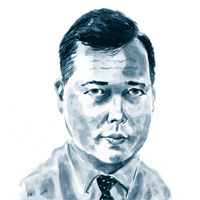Iain Duncan Smith, the Work and Pensions secretary, announced last month in a report from something called the ‘Family Stability Review’ that family breakdown in the UK currently costs the public purse £46bn a year, which equates to £1,541 each for the few of us who actually pay any tax.
This, by all accounts, is not a good thing. And because no politician can resist for long the temptation to do a little social engineering, later this year IDS will present a series of policies intended to reduce the levels of family breakdown. According to The Daily Telegraph, officials have proposed a raft of measures to help couples at risk of splitting up.
Alongside the usual maelstrom of younger parents forming temporary sexual alliances, brief co-habitations and the plethora of confused children who aren’t sure who their Dad is this week until they see who turns up at breakfast, there is a new phenomenon that has been dubbed, in the made-for-the-headlines soundbite of the month, the ‘silver splitters’.
These are older ‘baby boomer’ couples, who have apparently tired of each other’s haemorrhoids, unpleasant chewing noises and endless anecdotes of bohemian life in the Sixties. They want out. They want to go to Marrakech again, but this time alone. They’ve had enough.
Society demands, though, for reasons of economy, that we keep these wrinkly old gits together, rather than letting them have some freedom, happiness and a house each. And who do you think the Government believes are the best bet to manage this delicate task? Well, according to the Telegraph report at least, that would be you and me.
Mr Andrew Selous, a senior Tory MP and a supporter of the policy, declared: ‘Older people are the biggest users of the NHS, and GPs are ideally placed to provide support themselves or signpost appropriate support to couples in or near retirement who are on the verge of splitting.’
This is all very welcome, obviously. What with all this spare time on my hands, I can hardly wait to get down to this new and exciting addition to my professional responsibilities. No matter that I’m not trained as a relationship counsellor, don’t consider myself an arbiter of individual choice and have little or no interest in what my fellow citizens get up to behind their own front doors. I can see exactly how this is going to play out.
‘I’ve got an irritating rash in my parts, doctor,’ says Mr Smith, shifting uncomfortably in his chair.
‘That’s not what we’re here for, you tedious old git,’ interrupts Mrs Smith. ‘Stop mucking about and tell him about the crushing chest pains.’
‘Let me stop you there, good people,’ say I. ‘Do I detect a certain tension in this relationship? Let’s explore this further. Tell me – how many times do you two have it off these days?’
Mr Smith clutches his chest, goes blue, and falls off his chair. Resuscitation will be unsuccessful, no doubt. But I will at least be able to faithfully inform Mr Duncan Smith that I kept them together ‘until death do us part’, and that‘s the important thing.
Dr Phil Peverley is a GP in Sunderland

















